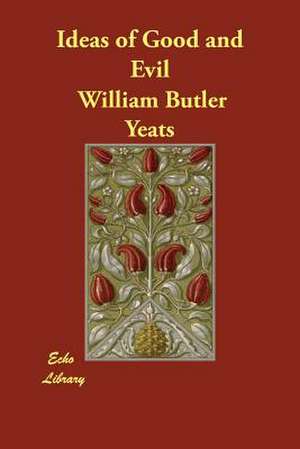Ideas of Good and Evil
Autor William Butler Yeatsen Limba Engleză Paperback – 17 mar 2015
| Toate formatele și edițiile | Preț | Express |
|---|---|---|
| Paperback (5) | 49.97 lei 3-5 săpt. | |
| Mint Editions – feb 2021 | 49.97 lei 3-5 săpt. | |
| CreateSpace Independent Publishing Platform – | 50.09 lei 3-5 săpt. | |
| CreateSpace Independent Publishing Platform – | 58.30 lei 3-5 săpt. | |
| CREATESPACE – | 102.73 lei 3-5 săpt. | |
| Echo Library – 17 mar 2015 | 81.80 lei 38-44 zile | |
| Hardback (1) | 101.52 lei 3-5 săpt. | |
| Mint Editions – feb 2021 | 101.52 lei 3-5 săpt. |
Preț: 81.80 lei
Nou
Puncte Express: 123
Preț estimativ în valută:
15.66€ • 16.45$ • 13.16£
15.66€ • 16.45$ • 13.16£
Carte tipărită la comandă
Livrare economică 07-13 martie
Preluare comenzi: 021 569.72.76
Specificații
ISBN-13: 9781406857672
ISBN-10: 140685767X
Pagini: 116
Dimensiuni: 152 x 229 x 7 mm
Greutate: 0.18 kg
Editura: Echo Library
ISBN-10: 140685767X
Pagini: 116
Dimensiuni: 152 x 229 x 7 mm
Greutate: 0.18 kg
Editura: Echo Library
Notă biografică
W.B. Yeats (1865-1939) was an Irish poet. Born in Sandymount, Yeats was raised between Sligo, England, and Dublin by John Butler Yeats, a prominent painter, and Susan Mary Pollexfen, the daughter of a wealthy merchant family. He began writing poetry around the age of seventeen, influenced by the Romantics and the Pre-Raphaelite Brotherhood, but soon turned to Irish folklore and the mystical writings of William Blake for inspiration. As a young man he joined and founded several occult societies, including the Dublin Hermetic Order and the Hermetic Order of the Golden Dawn, participating in séances and rituals as well as acting as a recruiter. While these interests continued throughout Yeats¿ life, the poet dedicated much of his middle years to the struggle for Irish independence. In 1904, alongside John Millington Synge, Florence Farr, the Fay brothers, and Annie Horniman, Yeats founded the Abbey Theatre in Dublin, which opened with his play Cathleen ni Houlihan and Lady Gregory¿s Spreading the News and remains Ireland¿s premier venue for the dramatic arts to this day. Although he was an Irish Nationalist, and despite his work toward establishing a distinctly Irish movement in the arts, Yeats¿as is evident in his poem ¿Easter, 1916¿¿struggled to identify his idealism with the sectarian violence that emerged with the Easter Rising in 1916. Following the establishment of the Irish Free State in 1922, however, Yeats was appointed to the role of Senator and served two terms in the position. He was awarded the Nobel Prize in Literature in 1923, and continued to write and publish poetry, philosophical and occult writings, and plays until his death in 1939.
